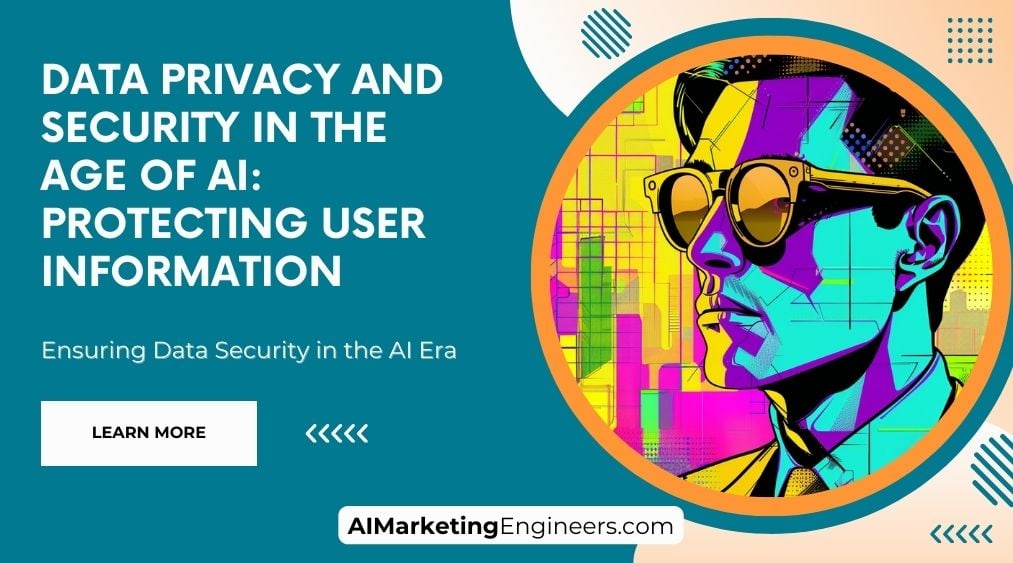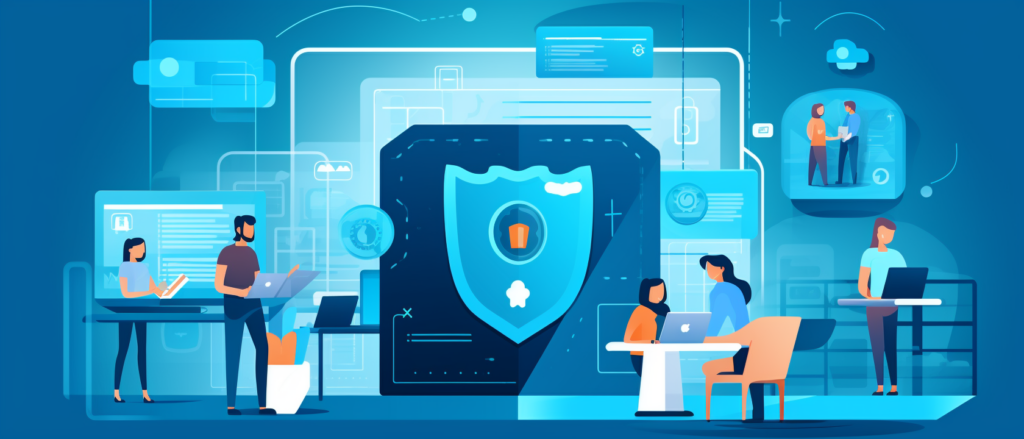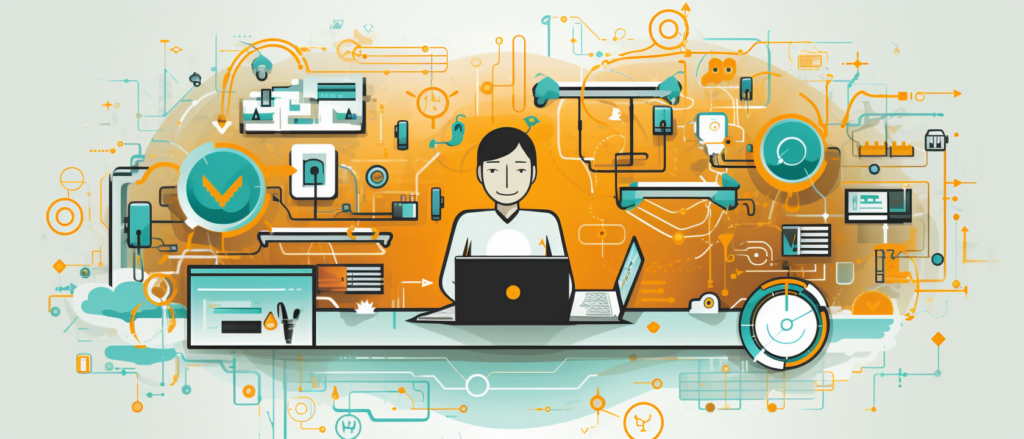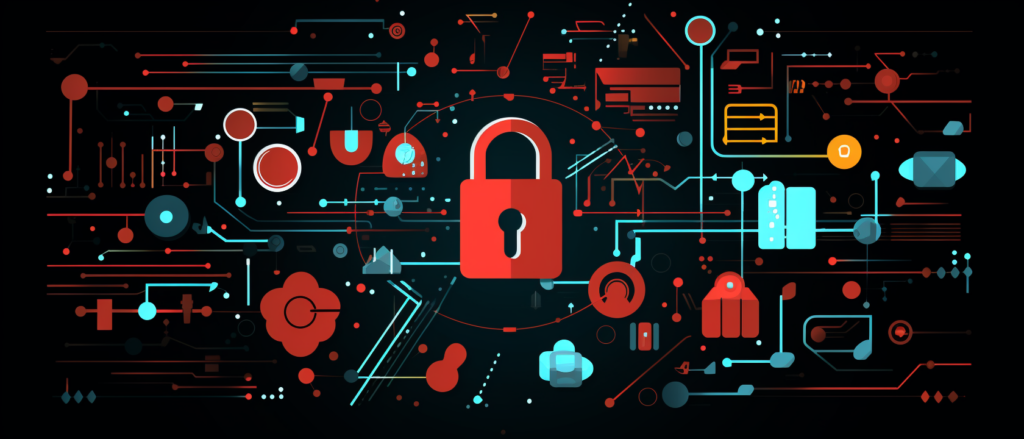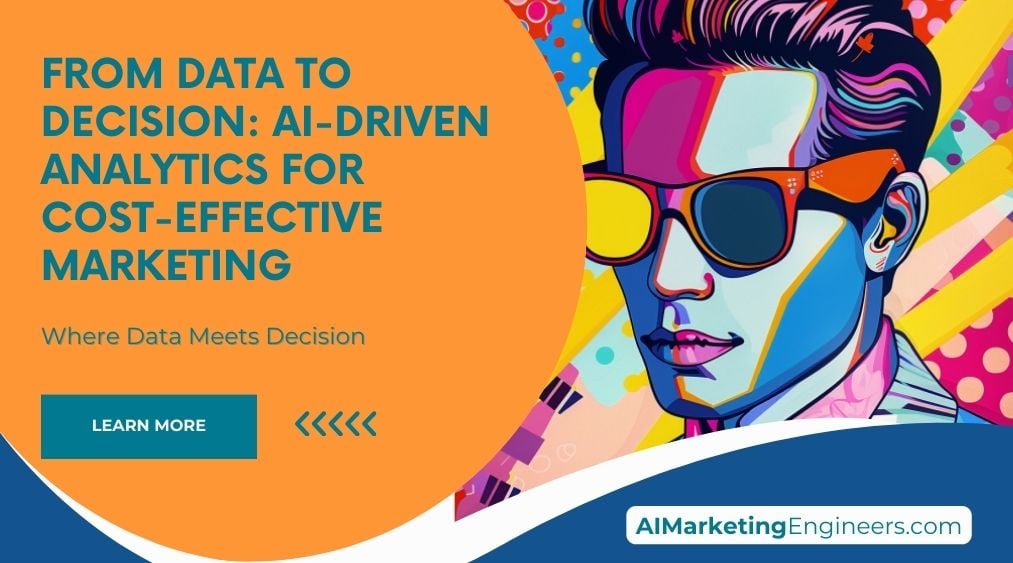Key Takeaways
✅ Implementing Robust Security Measures: In the AI era, the safety net for your data lies in strong security protocols. Think unbreakable locks on digital doors – encryption, rigorous access controls, and continuous security checks help keep prying eyes out of your personal life.
✅EnsuringTransparency and Accountability: Who's watching the watchers? In the realm of AI, keeping a clear and honest record of data dealings isn't just nice, it's necessary. Regular checks and balances, following the rulebook of data laws like GDPR and CCPA, can build a bridge of trust with users – a critical foundation in today's digital house of cards.
✅ Educating Users and Promoting Privacy-by-Design: Have you ever thought about what's behind the curtain of your favorite AI-powered app? Educating the crowd on data dos and don'ts, and baking privacy into the DNA of tech, can turn users from passive spectators to informed defenders of their digital domain.
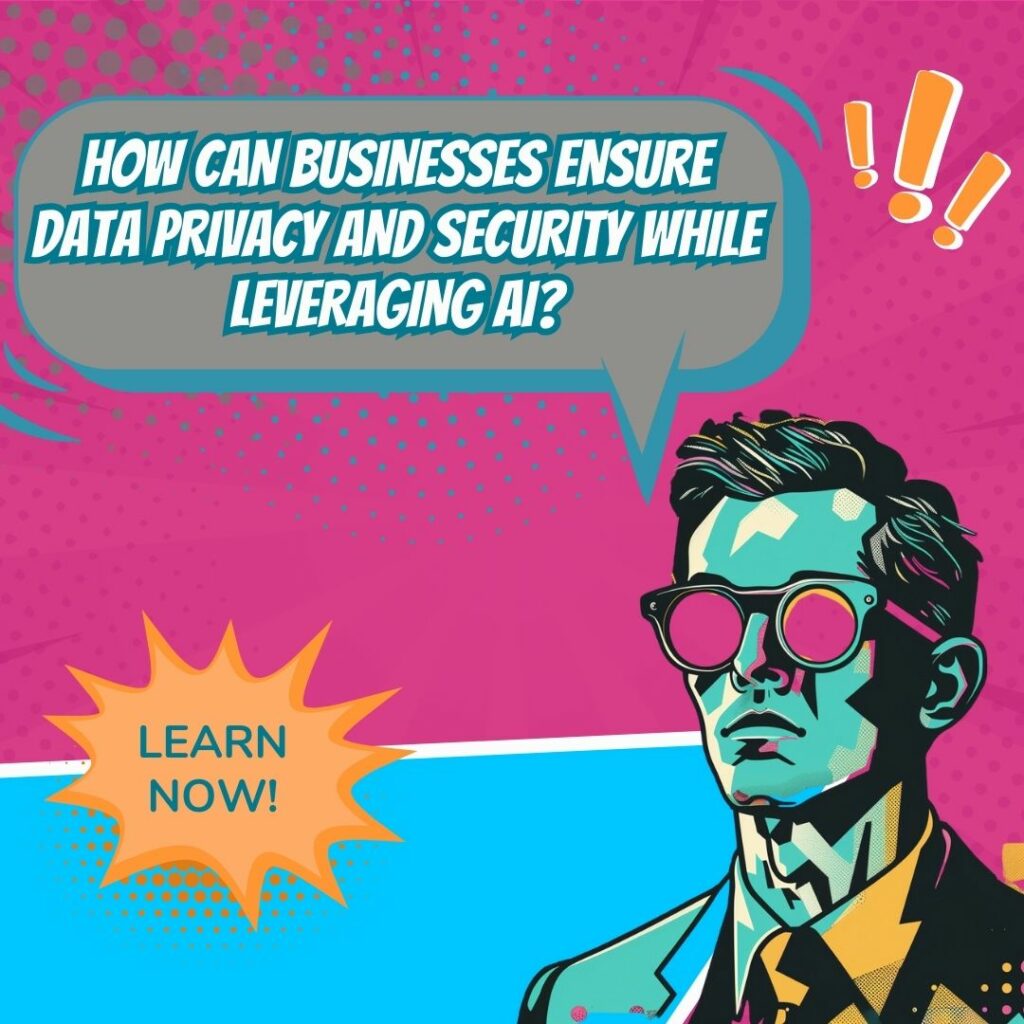
Introduction
Imagine walking through a city where every billboard knows your name, every shop remembers your last visit, and whispers about your preferences flit through the air like paper planes in the wind. Welcome to the era of AI, where data privacy and security are more than just buzzwords – they're the backbone of your digital life. But as AI gets smarter, are we keeping up with safeguarding our digital selves?
In this journey, we'll navigate the bustling crossroads where personal data, hungry AI systems, and looming threats meet. We'll peek into the data treasure troves that AI digs into, learn about the bogeymen of the digital shadows, and arm ourselves with the best shields and strategies to stay safe. Are you ready to not just survive but thrive in this new landscape?
In a world of ones and zeros, where every keystroke tells a story, the plot thickens with potential risks and rewards. This article is your compass in the land of algorithms – where every path could lead to treasure or traps. Stay with us, as we reveal the secrets of revolutionizing data privacy and security in the age of AI and present you with a wealth of actionable insights and groundbreaking information that could be the difference between being a data pawn and becoming a privacy knight.
Top Statistics
| Statistic | Insight |
|---|---|
| Data Privacy Market Growth: The market is projected to grow from $2.3 billion in 2020 to $5.6 billion by 2025, at a CAGR of 17.2%. (Source: MarketsandMarkets) | Such rapid growth indicates an increasing priority on data privacy for businesses and consumers alike. |
| AI in Cybersecurity: Expected to reach $38.2 billion by 2026, growing at a CAGR of 23.3%. (Source: MarketsandMarkets) | Data Privacy and Security in the Age of AI Protecting User Information_image |
| Consumer Data Privacy Concerns: 79% express unease about how personal data is utilized. (Source: Salesforce) | Anchoring a call for businesses to-transparently and- ethically manage user information—a significant relationship factor. |
| Data Privacy as a Human Right: 86% believe so, with 63% ready to share data if companies are responsible. (Source: Cisco) | Demonstrates a balancing act between the need for personalized experiences and maintaining individual trust. |
| Loyalty versus Privacy: 87% will switch companies if trust in data practices wanes. (Source: PwC) | Loyalty is fragile with privacy concerns; companies must prioritize data protection to keep their customers. |
Understanding Data Privacy and Security in AI
Ever stopped to ponder how much of your life an AI knows? Those smart little programs that suggest movies, help you shop, or even read your emails are kind of like that one friend who knows a tad too much about you. AI technologies collect and, frankly, process mountains of user data—from the name on your birth certificate to every like, share, and heartbeat you gave permission to monitor. It's a treasure trove for them, but for us, it's the precious cargo of our personal identity at sea with potential pirates around. Sure, there's promise in the wind, but what about the risk of hitting an iceberg with our eyes closed?
What Are AI Systems Sniffing Around For?
Speaking of treasure maps, think about the types of user data AI systems love to get their hands on. Your personal info like age, hometown, and who you're pals with, or even your behavioral data: the shows that keep you glued to the couch or the ads that make you click faster than lightning. And let’s not forget biometric data: the way you walk, talk, and even your heartbeat rhythm. Imagine your AI fitness coach knowing you better than your mom does! Let me tell you, the way these bits and bytes are collected could give Sherlock a run for his money—with sensors, clicks, likes, and swipes all playing their part.
Is Our Data Playing Hide and Seek with Threats?
So then, what lurks in the digital shadows, eyeing that juicy data pie? Unauthorized access and data breaches are like unwanted guests at a party, and they can dance away with your digits, leaving you and your bank account feeling a bit, well, violated. Ever heard those horror stories about identity theft or a brand getting their reputation dragged through the digital mud? It's no urban legend; it's the ghost in the machine we're all trying to ignore.
Suiting Up Our Data for Battle
If that's the ghost, then think of encryption and access controls as the Ghostbusters. They're the front line in defending our digital personas. They scramble up your data into an unreadable mess for anyone who isn't intended to see it. And hey, data anonymization? That's like giving your data a mask and cape so that even if the bad guys get a peek, they won't know who's under there.
Playing by the Rules: Regulatory Frameworks
It's not just you and me trying to keep our secrets; there are big wigs making rules, too. Meet GDPR, CCPA, and HIPAA—not the latest pop group, but the bouncers at the data party, keeping everything in check. Don't follow their steps, and you're in hot soup, facing fines so big they'll make your eyes water.
AI: The Unexpected Hero of Privacy and Security?
But it's not all doom and gloom. AI could be swinging in to save the day, wearing the cape of the hero we didn't expect. It's got some tricks up its sleeve, like spotting fishy behavior way faster than a human could or making encryption even tougher to crack. Who knew the same tech we're giving side-eye to might be the one taking up arms for our data privacy and security?
The Call to Keep Our Digital Streets Safe
Before you ride off into the sunset, let's not forget that keeping our data snug as a bug is a group project. It's a call to arms for everyone—you, me, the suits in the companies, and the policymakers shaping our digital world. It's about making this AI age a bit less Wild West and a lot more friendly neighborhood, with privacy and security as the new sheriffs in town. Ready to join the watch?
AI Marketing Engineers Recommendation
Recommendation 1: Prioritize Transparency in AI Systems: Let's talk trust—something that's not earned easily, right? In our world brimming with tech wonders, it's hard to keep up with what's going on behind the digital curtain. And, when AI is in the game, the rules seem even trickier. But here's the deal: be transparent. Show your users how you're using their data and for what purpose. Seriously, it helps everyone relax a little. Plus, did you know that studies show users are more willing to share their information when they know how it's being used? That's a win-win in my book.
Recommendation 2: Keep Up with the Changing Landscape of Privacy Laws: Anyone else feeling like privacy laws are evolving faster than a viral dance trend on social media? One day it's GDPR, the next it's CCPA or something new from Brazil or Japan. These laws are telling us loud and clear: respect the user's privacy. So, my advice? Stay on top of these changes like you’d follow your favorite food blogger for the latest drool-worthy trends. When you keep your company in the know, you not only dodge hefty fines but also show your users that you care about their rights. And people remember that.
Recommendation 3: Embrace Privacy-Enhancing Technologies (PETs): Okay, ever heard of PETs? And no, I'm not talking about those furry friends we adore. In our tech jungle, Privacy-Enhancing Technologies are the new cool kid on the block. These tools help you protect user data while still gaining useful insights. Imagine anonymizing data or using encryption methods so that you get to keep digging into those analytics without stepping on any privacy landmines. It’s pretty neat! And here's the kicker: adopting such technologies can set you apart, making you the good guy in a world where trust is rarer than a perfectly ripe avocado.
Remember, in the grand tale of AI and marketing, you're the hero who saves the day by safeguarding user data. So wear that cape with pride and let’s keep the digital world a bit safer for everyone, shall we?
Relevant Links
Ready to Boost Your AI Marketing Game? Harness the Power Now!
Transform Your Content Strategy with ChatGPT – The Ultimate Marketer's Ally
Small Business Growth Unleashed: Discover the ChatGPT Revolution!
Small Business Owners Rejoice - ChatGPT's Cutting Edge Technology Is Here to Elevate Your Business
Supercharge Your Google Ads with the Might of AI Text Optimization!
Revolutionize Your Ad Copy with AI – ChatGPT's Secret to Skyrocketing Conversion Rates Revealed!
Data Privacy Dilemmas in AI? Strategies to Safeguard Your Digital Identity!
Is Your Personal Data Safe? Navigating the High Seas of AI's Privacy Challenges
AI's Role in Reshaping Marketing Ethics – A Crucial Insight for Every Marketer!
When AI Meets Marketing: Ethical Boundaries Explored and Explained
Conclusion
So, what have we gathered from this journey through the tangled web of data privacy and security in the AI era? It's crystal clear that as AI continues to gobble up data at an unprecedented pace, the risks and stakes are shooting through the roof. We've seen just how much of our personal, behavioral, and even biometric information is being hoisted into the AI stratosphere, and it's a bit daunting, isn't it? The threats are not just plots from some sci-fi movie—they're real and can hit hard, from identity theft to deep financial woes, and let's not even get started on the hit your reputation could take.
The good news is, there are lifelines out there. Best practices like encryption and controlled access are not just fancy terms; they are essential tools in the battle to safeguard our precious data. And the alphabet soup of regulations—GDPR, CCPA, HIPAA—are not just boxes to tick. They're commitments, shields against an often-unseen enemy, and non-compliance isn't an option if trust and integrity are on your priority list.
But AI isn't just the problem—it's part of the solution, too. Imagine AI as the smart guard dog that can sniff out the cyber tricksters, sealing up those vulnerabilities with cutting-edge tech and keeping your digital fortress secure. It's a powerful ally, making the digital ecosystem not only smarter but safer.
So where do we go from here? For users, it's about staying informed and cautious. For organizations, it's a wake-up call to put data security at the forefront of innovation. And for policymakers, it's a nudge to keep those regulations robust and in sync with technology's breakneck pace. Let's embrace AI's potential without throwing caution to the wind because at the end of the day, it's not just data we're protecting—it's our lives, our identities, and our futures.
FAQs
Question 1: What is data privacy and security in the context of AI?
Answer: Imagine you're trusting someone with a secret. Now, that's your personal data. Data privacy and security is like that friend who promises to keep your secret safe. In the AI world, it means making sure the data that AI systems learn from stays confidential and is only used the right way.
Question 2: Why is data privacy and security important in AI?
Answer: Think of personal data like the ingredients in your favorite dish. Just as you want quality ingredients for a tasty meal, AI needs good data to work well. But if someone messes with those ingredients, it's a recipe for disaster. That's why keeping data safe is key – it keeps our trust intact and stops bad stuff from happening.
Question 3: What are the common threats to data privacy and security in AI?
Answer: It's a bit like a game of whack-a-mole – there's always a new threat popping up. Hackers might try to sneak a peek at private data, or worse, steal it for something sneaky. Other threats include folks messing with the data or not handling our data the way they promised.
Question 4: What are the key regulations and guidelines for data privacy and security in AI?
Answer: There's a whole rulebook for this stuff, with names like GDPR in Europe and CCPA in California. Plus, smart folks at NIST and ENISA lay down some best practices to keep everyone playing the game fair and square.
Question 5: How can AI systems be designed with data privacy and security in mind?
Answer: Designing an AI system that respects privacy is like building a house with a good lock on the door. It means using special tools that keep data anonymous and thinking about privacy at every step of the process, just like picking out the best locks before you even start building.
Question 6: What is the role of data anonymization in protecting user information in AI?
Answer: Data anonymization is like a disguise. It's about tweaking personal details so that the data can't be traced back to you. With a good disguise, information can be used to teach AI without giving away who you are.
Question 7: How can AI systems be trained without compromising user privacy?
Answer: Fancy techniques like federated learning teach AI by using little bits of data from all over the place, without putting all your eggs in one basket. Picture it like a potluck dinner where everyone brings a dish – you get a great meal (or a well-trained AI) without anyone having to reveal their secret recipes.
Question 8: How can organizations ensure responsible data sharing in AI?
Answer: It's all about setting clear rules, kind of like personal boundaries. Companies should ask nicely before sharing your data and lay out strict terms for who gets to see what. It's like lending a book to a friend – you'd want to be sure they'll take good care of it and give it back when they're done.
Question 9: What is the role of AI in enhancing data privacy and security?
Answer: AI can be the superhero that helps protect other data. It can spot trouble quickly and keep an eye on things to make sure no one's breaking the rules. It's like having a smart security guard who's always on duty.
Question 10: What practical steps can individuals take to protect their data privacy and security in AI?
Answer: You've got some power in this game, too. Be careful about who you tell your secrets to, lock things up with strong passwords, and watch out for sneaky scams. Keep an eye on your privacy settings and stay in the know about how to keep your data safe.
Academic References
- Hildebrandt, M., & Gutwirth, S. (2018). The Age of Artificial Intelligence and Machine Learning: Implications for Privacy, Security, and Democracy. Critical Criminology, 26, 455-471. This insightful article delves into how AI and machine learning have transformed the privacy and security landscape, stressing the urgency for updating legal and technical defenses to keep user information safe.
- Bambauer, J. (2019). Privacy and Security in the Age of Artificial Intelligence. This paper tackles the complexities at the heart of AI's impact on privacy and security, underscoring the vital roles of accountability, transparency, and user control in AI technologies.
- Cavoukian, A. (2018). The Importance of Privacy in the Age of Artificial Intelligence. Information and Privacy Commissioner of Ontario, Canada. Ann Cavoukian ponders over the critical need for robust privacy safeguards and the cultivation of responsible AI habits to protect our digital selves.
- Zhang, Y., et al. (2020). Privacy and Security in the Age of Artificial Intelligence: A Survey. IEEE Access, 8, 182338-182359. This comprehensive survey lays out the main privacy and security hurdles in the realm of AI, discussing a spectrum of technical, legal, and ethical imperatives for the preservation of user information.
- Li, X., et al. (2021). Privacy and Security in the Age of Artificial Intelligence: A Review of Challenges and Solutions. Sensors, 21(17), 6233. A critical review that encapsulates the challenges and proposed solutions surrounding privacy and security in AI, advocating for methodologies to preserve privacy, bolster security, and foster responsible AI usage.
